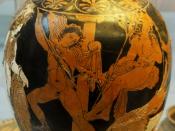The tragedy of tragedies We seek the truth in things because knowledge serves us. We also seek the truth because we believe it to go hand in hand with righteousness. Hence, man has sought to live in righteousness by seeking the truth in all things. However, Sophocles raises a moral dilemma in which a man, who religiously seeks the truth, falls victim to perhaps the greatest tragedy of all time. More specifically, Oedipus searches for the truth concerning his birth. Although Oedipus seeks the truth along with the expectation that the truth will allow him to set things right; however, the play suggests that Oedipus's righteous intentions prove to be disastrous. Rather than illustrating the pursuit of truth to be virtuous, Sophocles presents the pursuit of knowledge as a forbidding journey with the power to destroy.
Sophocles protects the righteous by redirecting the blame for Oedipus' misfortune onto fate. Oedipus is a righteous man.
The only evidence questioning his righteousness was the act of (unknowingly) killing his biological father, Laius. However, during the period in which Oedipus the King was written, it was honorable to seek justice when one has been wronged. Oedipus was mistreated and therefore sought justice. Oedipus, when faced with an opportunity to seek the truth, pursued it with conviction. He sought to find his true birth parents, but a distressing prophecy was revealed to him. Being the righteous man he is, he attempted to thwart his fate by leaving his parents. Later, he journeys into Thebes (his true birthplace) and saves its people from the terrorizing sphinx. The people of Thebes are grateful and make Oedipus their king. Moreover, Oedipus' righteousness propels him to capture the murderer of his predecessor king Laius. When Tiresias's reluctance to answer Oedipus during their first encounter enrages Oedipus,


